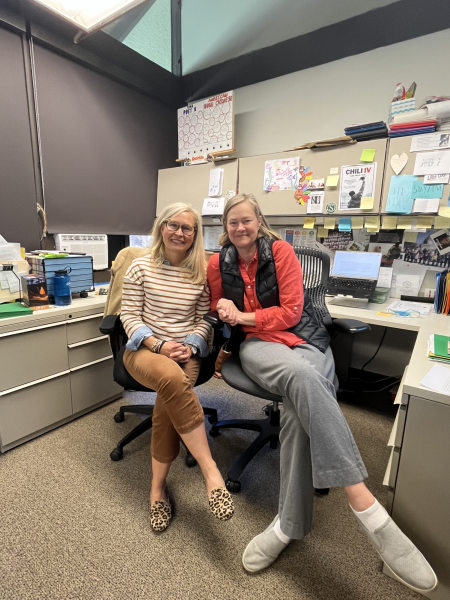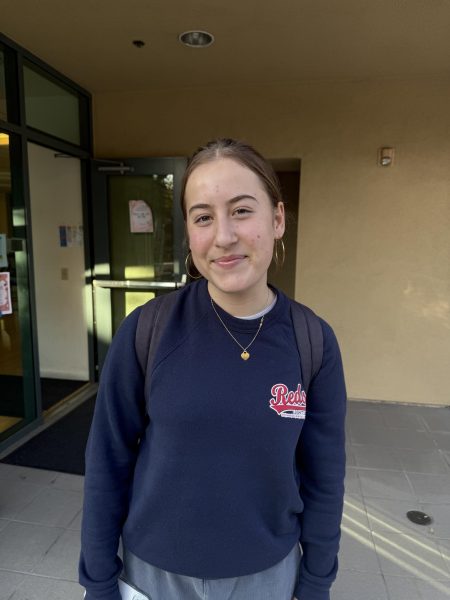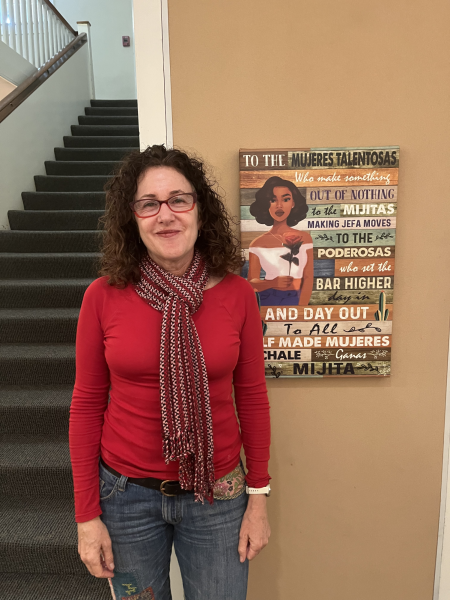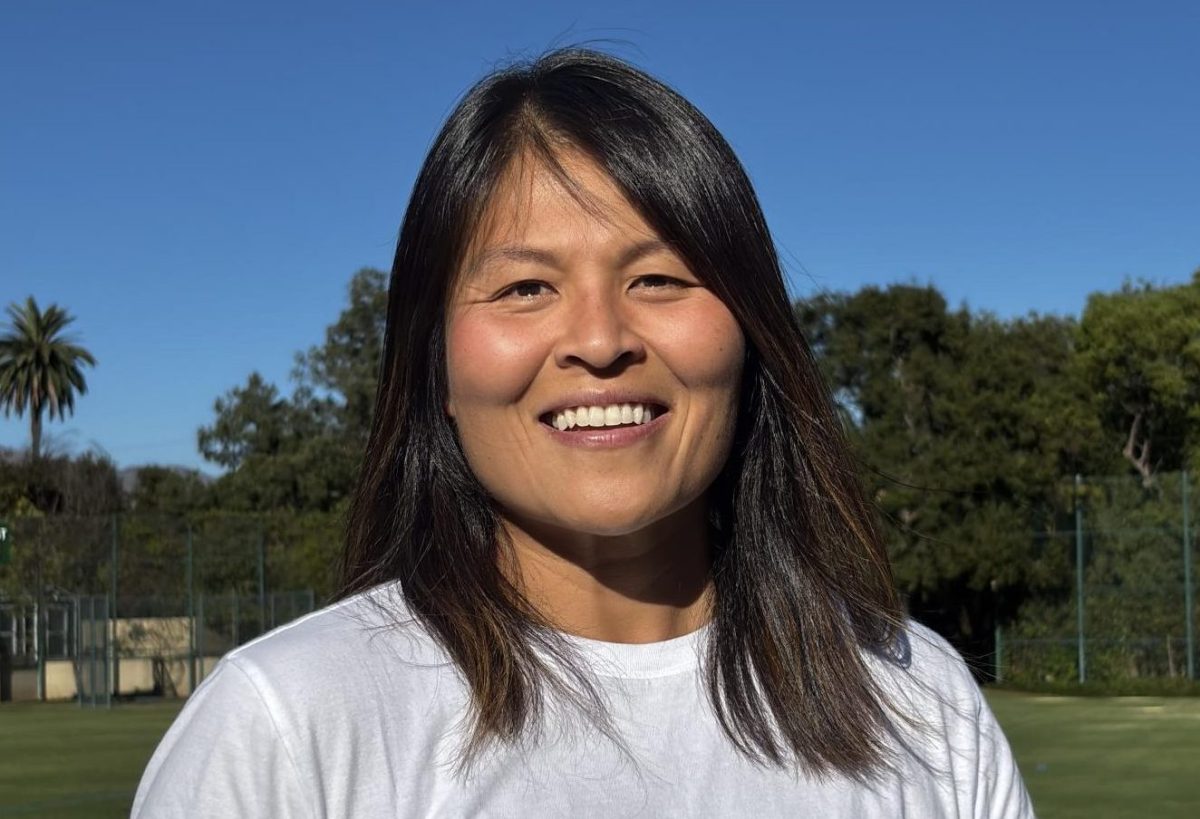
The end of her eighth grade year was challenging for Soledad B. ’28. When she first entered Upper School as a ninth grader, she was really excited at the idea of new freedoms, more class options, and the chance to have a fresh start. “I feel like I’m learning at a better pace, and I like the freedom more [of Upper School],” said Soledad, reflecting on her transition from Middle School. Soledad eagerly embraced change by exploring her interests and gaining new responsibilities.
But the move to Upper School is not without its challenges. Like many of her peers, Soledad now has to manage her time more efficiently and adapt to higher expectations.
9th Grade Class Dean and Upper School Teacher Mr. Daniel Calmeyer pointed out that the freedoms of Upper School come with new responsibilities to balance. “I think in ninth grade, students are given more freedom than they had in eighth grade, and commitments to things like theater, music, and [other extracurriculars]…add up,” he said.

Students like Abbie Z. ’28 have noticed the added responsibilities of Upper School. She said, “I feel like [the homework load] has gotten heavier, specifically for humanities, and I have a lot of extracurriculars, so I barely have any time to do assignments at home.”
One of the major components of Middle School is fostering the development of study skills during study hall and advisory to support student time management. 8th grade History teacher and Head Class Advisor Ms. Jennifer Irish said, “I think a component of advisory has often been study skills, but it depends, year to year, whether we feel like that class needs it or doesn’t need it as much.”
Joanna B. ’28 felt mostly prepared with her study skills, but she has found that time management is even more important in Upper School. “During my free [block], I don’t really get a lot of work done because I do chat with friends, so I think it would be nice to have a study hall. But it all depends, as [with] some free [blocks], I can really focus,” she said.

Mr. James Evans, Director of Teaching and Learning, believes that incorporating time management and study skills in ninth grade might be worth looking into. “I think it’s interesting that ninth graders don’t have to have free periods [or] study halls, and therefore any study skill practice, or learning they’re doing is, in theory, integrated into the class,” Mr. Evans said.
However, some teachers suggest that time management is best learned through experience rather than direct instruction within classes. “I think people learn time management through trial and error, and so they learn, ‘Oh, have I been wasting my time?’ or ‘Do I study effectively?’” said Upper School History Teacher Mr. Bill Harrison, who teaches three blocks of 9th grade History. He continued, “It’s not something [students are] going to learn from the study hall… the study hall can explicitly teach [study skills], but it doesn’t mean that anybody would absorb it.”
Instead, Mr. Harrison emphasized that students’ experiences in their classes play a key role in developing these skills. “I think it’s more that [study skills] have to come from [students’] experience in a class, rather than being taught separately,” he explained.
Contrary to adopting skills through experience or implementation in curriculum, Upper School History Teacher Ms. Jennifer Cutler, another 9th grade History teacher, believes that if time management were an issue in Middle School, it’s still going to be an issue in Upper School.
Hayden Y. ’28 believes that depending on the class, she can learn study skills within class materials, like Biology Vocabulary Matrixes. However, in other classes, like math, it can be difficult to learn study skills, as she mostly relies on teachers to explain concepts.
Even with the new classes and extracurricular opportunities in Upper School, students have mostly found the overall jump from eighth to ninth grade to be manageable.
“There was still some navigating to do, but I don’t feel completely lost. I think I was prepared to some extent,” said Abbie Z. ’28.

8th grade teachers describe the transition as an “appropriate step up,” designed to keep students from feeling overwhelmed. 8th grade Humanities teachers design their classes with their students’ growth in mind, while balancing it with a normal eighth grade curriculum. “The big goal is that we’re trying to make sure it’s not a huge jump, [but] not completely flat, just the appropriate level of eighth to ninth,” 8th Grade History Teacher Ms. Jennifer Irish said.
Ms. Kara Ramirez, 8th Grade English teacher and Middle School Curriculum Chair, tries to prepare students for Upper School while also keeping eighth grade centered around its developmentally-appropriate curriculum. “While we think about what students should know before their next transition, we also want to do what’s appropriate within an eighth grade curriculum,” said Ms. Ramirez.
As students adapt to higher expectations, many have found themselves challenged academically, particularly in their English and History classes. Soledad noted that there’s a smooth transition within most subjects, but the jump in expectations, particularly in English and History feels steeper. “I just think that adapting to different teaching styles can be hard, especially from Middle School to Upper School…and a lot of us weren’t prepared for that,” said Soledad, speaking about expectations for writing.

Regarding the humanities, Ela K. ’28 said, “I think that Upper School expects a lot from us instead of helping us ease into the year.”
As part of the jump in expectations, 9th grade teachers expect more formal analytical writing, contrasting Middle School’s focus on more creative, reflective writing, catching many students off guard even as some feel prepared to rise to the challenge. “But I think in terms of humanities, the grading system has definitely gotten stricter and less lenient,” Abbie Z. ’28 said. “The expectations have gone up quite a lot compared to last year, when we were just practicing to write, and this year we’re actually writing.”
In eighth grade, the humanities curriculum focuses on introducing foundational skills and offering opportunities for practice and exploration. “Practicing deeper thinking and more formal writing was a big part of the 8th grade English curriculum,” said Ms. Ramirez. “But we still also have opportunities to weave in more of the creative and expressive projects that are part of being an eighth grader.”
The curriculum allows for flexibility, adjusting to the strengths and needs of each class. “Each grade has different strengths and experiences. Some classes need reinforcement in a certain way, while others might need to be stretched. They’re all already showing proficiency in a certain skill,” Ms. Ramirez said.
By the end of eighth grade, students begin transitioning toward more analytical and formal assignments, but creative writing and projects are still included in their learning. In contrast, the ninth grade curriculum launches directly into refining analytical writing. Mr. Evans explains how the eighth grade curriculum flows into the ninth grade curriculum, “The practice [freshman students] had last year in the 8th grade History class is kind of like a more targeted, more supported step into the expectations in ninth grade,” he said. “For example, the 8th grade English curriculum moves from topic sentence creation to thesis statement construction, which you revisit and refine again in ninth grade.”
This progression is intentional, as teachers believe the groundwork laid in middle school provides students with the tools they need to succeed in upper school. “They’re definitely prepared enough to do what we do…even if the reading might be a little hard,” said Mr. Harrison. Still, for many students, the adjustment takes time.
While students have found themselves struggling with raised expectations and different grading systems, especially in humanities classes, Upper School teachers strive to be intentional around supporting students in their transition to Upper School. Mr. Calmeyer said, “I think a lot of the ninth grade teachers do a great job of understanding that this is a transition year from eighth to ninth grade, so the leap in expectations isn’t quite as huge as it might be.”
Dr. Diane Pintabone, Middle School and Upper School Latin teacher added, “I think [my ninth grade students are] making that adjustment and doing a good job of making sure they get their work done, realizing that will keep them from feeling frantic and stressed out.”

Upper School Dean of Student Life Ms. Bonnie Paiz Martinez emphasized that while the transition is smooth overall, teachers are aware that some students struggle. “We keep our eyes on [students], and we try to have frequent meetings with advisors, with teachers, asking if kids are doing well academically, socially and also mental health wise too,” she said.
According to Ms. Martinez, 9th grade teachers make an effort to check in with students regularly, encouraging them to seek help when needed. “We’re very aware of the developmental difference of a ninth grader versus twelfth grade,” Ms. Martinez said.
To help students adjust to Upper School, ninth grade teachers aim to provide more detailed instructions and additional support during the transition. Ms. Martinez described this approach as “hand holding,” as teachers “slow things down,” and offer clearer directions compared to other grades. “Teachers will be a lot more explicit in [9th grade] English classes,” Ms. Martinez said. “They’ll probably call you in for help, because they know that you’re still transitioning, and not everyone really understands.” However, she acknowledged that the adjustment period varies for each student, noting, “I think everyone hits their stride at different times.”




























![Dr. Zanita Kelly, Director of Lower and Middle School, pictured above, and the rest of Westridge Administration were instrumental to providing Westridge faculty and staff the support they needed after the Eaton fire. "[Teachers] are part of the community," said Dr. Kelly. "Just like our families and students."](https://westridgespyglass.org/wp-content/uploads/2025/03/dr.-kellyyy-1-e1748143600809.png)


























Anonymous • Dec 17, 2024 at 9:08 am
I love this article! As a current freshman, I totally agree!